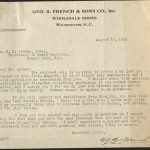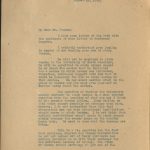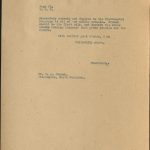Everything gets more stressful when parents get involved, especially choosing courses. In 1918, Llewellyn French signed up for a chemical engineering course that required 2 years of German. At the time, the U.S was fighting Germany in World War I. The war sparked a backlash against German culture and language. Llewellyn’s father, William, protested his son’s enrollment in German language in a letter to University President Edward Kidder Graham, “I thought every true American institution had discarded everything pretaining [sic] to the cursed German nation, and I assure you I for one am just red blooded enough not to allow it in my family. German cannot be spoken in my presence.”
President Graham responded the next day, explaining that the chemistry faculty found that students who didn’t read German had difficulty in that particular course. While it might seem like chemistry has nothing to do with foreign language, in the early 20th century many scientific texts were written in German. He further presented his own position on the language debate, arguing that educated men should continue learning German. After all, he said, “I do not think we should cease to study cancer simply because the cancer preys upon the healthy body.” However, Graham conceded that elementary schools should teach French, the language of America’s ally, rather than German.
This is not the only time that President Graham was asked to weigh in on the debate over German language. Other university presidents and the United States Commissioner of Education sent letters requesting that Graham make a public statement on his position. These letters, including the elder French’s incendiary missives, are preserved in the University of North Carolina Papers at the University Archives. You can see part of the exchange below:



